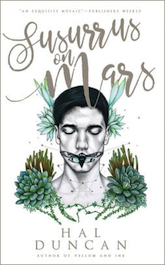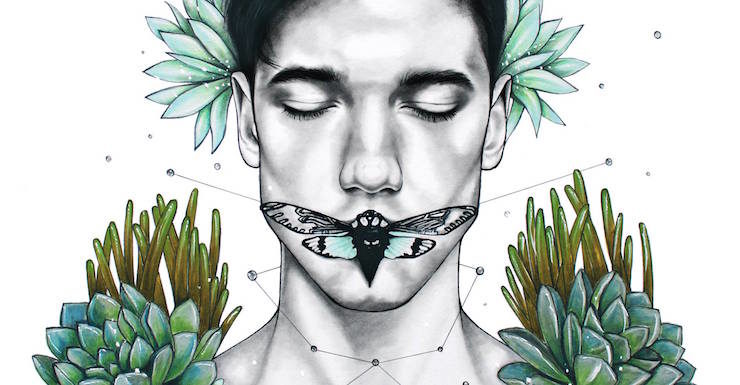Susurrus on Mars, published in late 2017 by Lethe Press, follows the flirtations and observations of Susurrus—the god of small breezes, a child of Zephyros and Ares. In large part the novella revolves around the courtship of Jaq and Puk, two young men who meet in Erehwyna, a terraformed Martian settlement. The novella contains eight sections, each subdivided into various philosophical and narrative segments, that come together at the close to tell a multifaceted tale of grief, attachment, and adoration.
A tapestry of scenes and reflections, Susurrus on Mars requires the reader to settle in for the ride and allow the threads to coalesce into their fantastical, complex whole. For the audience with the patience and interest to do so, it’s intensely rewarding and is, in some sense, an experience almost as much as it is a text.
Buy the Book


Susurrus on Mars
It would be remiss not to discuss the eroticism of Susurrus on Mars, oriented as it is around the bright flare of a romantic partnership springing up between two young men. Duncan has a gift for turning his tricksy, pleasurably convoluted prose to the physical; the lyrically pornographic worship of the blowjob in the novella’s seventh section is a good example. A fine mix of crude and tender, the human and the divine, fucking in Susurrus on Mars isn’t just fucking—it’s akin to art. I’m reminded of the lineage of queer sex in prose, Burroughs and Whitman and all the other writers Duncan references.
After all, this is a deeply and obsessively intertextual project. The scope of its pleasures ranges from ancient Greece to contemporary science fiction, philosophies of mortality to dick jokes, botanist’s litanies and godling’s gossip. It’s not a simple read, though it paradoxically also is. The three narrative threads that run throughout are: retellings of Greek myth on Mars, philosophical debate about being that undergirds a science fictional conflict about the Geister culture of old Earth, and a summer romance between two boys who are playing at eromenos and erastes.
Duncan weaves his three threads together in dense prose—dense to the point of purposeful clutter, dialect and lyric, provocative in its obfuscations. It’s the sort of prose that’s kin to poetry and damn well expects the reader to sink into it like an ocean if they expect to parse all of the potential implications, tricks, and twists. As a linguistics-obsessed ex-student of philosophy, it goes without saying that I find this kind of gamesmanship extremely enjoyable when it’s executed well—and Duncan executes it well. He’s in total control of the difficulties of Susurrus on Mars and deploys them for contrast and affect. Don’t expect to plow through the novella in one sitting; it’s more fun to sip it a mouthful at a time.
It also makes the wholesome clash of young love—the main storyline, after all—sweeter. Jaq and Puk are charming young men, brash and bright and a little dumb about each other, their courtship, their selves. Duncan works his science-fictional background easily into their courtship with things like Jaq tweaking his “kinsey” to a full “six” for Puk: a common enough option in this future, to choose a variation and strength of attraction, shifting his orientation for as long as he prefers to direct him utterly to his new love. They’re charmed by their imitation of Greek boys’ romance, charmed by each other as much as the reader is charmed by them and their scuffles.
The more mature of the storylines—the companionship between Ana and Renart—is also the source of more of the background plot: Ana and Puk’s parents were killed on Earth, and despite their refusal of the Geister tradition of creating an uploaded simulacrum of a dead person, they were uploaded anyway. That horror is the seed of Ana and Puk coming to Erehwynan. All of this, too, is interspersed with the botanical and mythological information about various plants that exist on Mars and their interactions with Susurrus, the titular breeze-god who touches all of our protagonists through the novella. Nature contains gods, or is itself god, et cetera.
The end result is a balance of the high-brow poetic and the low-brow pornographic, in the best possible sense, a natural comingling of human desires and instincts and fancies. Susurrus on Mars is the sort of project I’m thrilled to see, the weird child of queer literature, Western philosophy, and science fiction. It’s a provocative read, thoughtful and sensual, that I’ll peruse again at leisure more than once.
Susurrus on Mars is available from Lethe Press.
Lee Mandelo is a writer, critic, and editor whose primary fields of interest are speculative fiction and queer literature, especially when the two coincide. They have two books out, Beyond Binary: Genderqueer and Sexually Fluid Speculative Fiction and We Wuz Pushed: On Joanna Russ and Radical Truth-telling, and in the past have edited for publications like Strange Horizons Magazine. Other work has been featured in magazines such as Stone Telling, Clarkesworld, Apex, and Ideomancer.










